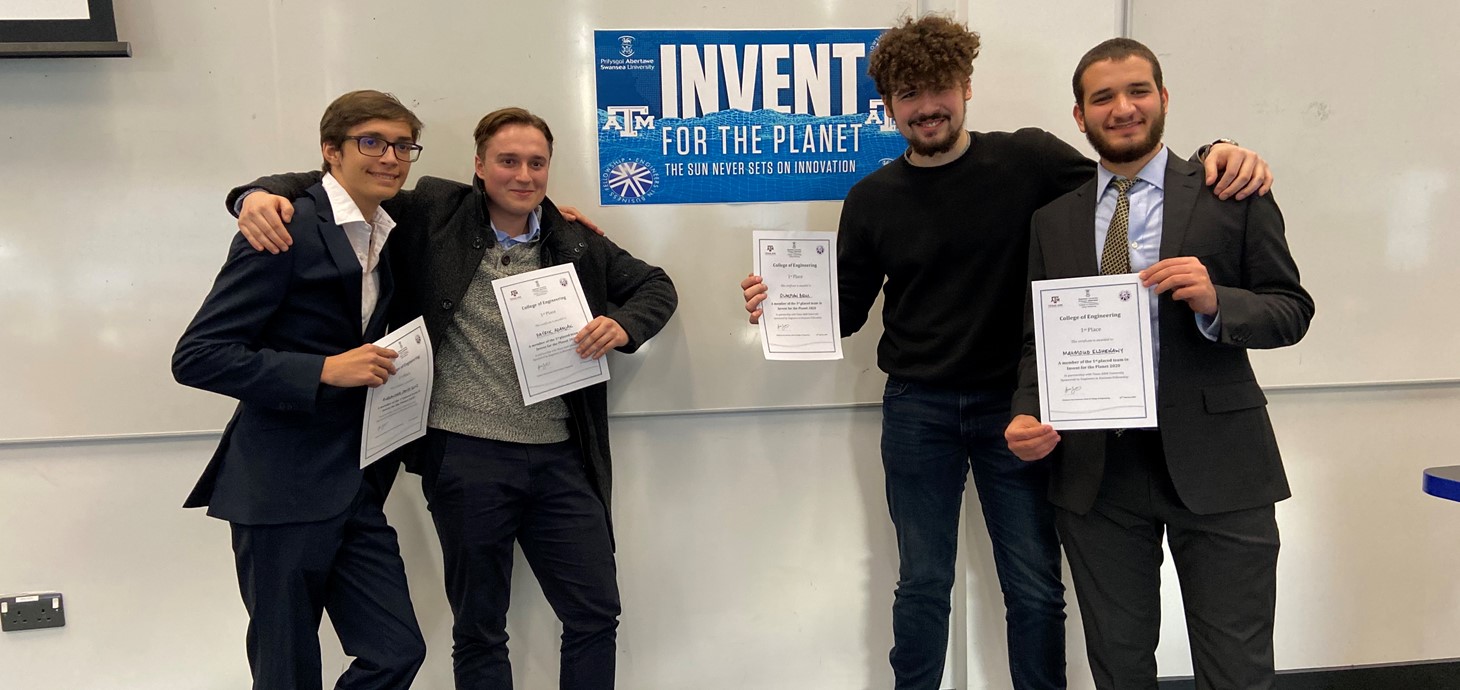These articles are now archived and will no longer be updated.

The winning team from L/R: Alexander Santo Ruiz, Patryk Adamiak, Olimpian Belu and Mahmoud Elshenawy.
A team of Swansea University students have developed a solution to improve emergency vehicle response times in a worldwide competition involving over 40 universities.
The students were one of six teams at Swansea to participate in "Invent for the Planet", a 48 hour intensive design experience led by Texas A&M University, one of the USA’s top ranked universities.
Around the world, delays caused by traffic congestion increase the response times of emergency vehicle to car accidents, fires, medical emergencies and terrorist attacks. The consequences of these delays include greater financial losses and increased fatalities, with research showing that in some countries up to 20% of patients needing emergency treatment die on their way to hospital because of traffic jams.
The students’ idea - which saw them named winners of the Swansea competition - was an Internet of Things system which alerts motorists to approaching emergency service vehicles ahead of time so that they can move out of the way.
Invent for the Planet involved 40 universities and over 600 students worldwide, but Swansea was the only British university invited to take part. Hosted by the College of Engineering, 32 students from 15 countries and seven engineering disciplines participated.
Students selected an engineering problem from a list of "Needs Statements" provided, including preventing bush fires, eliminating fake news, reducing ocean trash heaps and tackling single-use plastics. Teams then had 48 hours to research the topic, devise a solution, build a prototype and pitch it to a panel of judges.
The panel of judges included Professor Huw Summers (Head of the College of Engineering), Dr Laura Baker (Head, Product Management & Development, Tata Steel Strip Products UK), Alyson Nicholson (Head of JISC Wales) and Neil Barron (founder of Gusto Design Ltd) and the event was sponsored by the Engineers in Business Fellowship, a charity which encourages engineering students to participate in enterprise competitions to improve their skills in business and commerce.
Mahmoud Elshenawy, who was a member of the winning team, commented:
“I participated in Invent for the Planet in my first year and really benefitted from the guidance and mentoring I received from students and staff. Now that I’m in my final year I decided to participate again so that I could return the favour and share my experience and knowledge with others. I am delighted to be part of the winning team and really proud of our innovation which has the potential to save countless lives.”
The team’s success is another product of the flourishing partnership that Swansea University has built with leading universities in Texas, like A&M. The partnership also includes student exchange schemes and research collaborations in areas such as Nanomedicine.
Dr Caroline Coleman-Davies, who leads the University’s Texas Partnership, said:
“Texas A&M is an internationally renowned university with whom we have a long-established relationship and I was excited to help deliver Invent for the Planet in Swansea once again. The chance to work in multidisciplinary teams and interact with participants all over the world is a unique opportunity for our students which we hope will benefit them in their future studies and careers.”
Professor Huw Summers, Head of the College of Engineering at Swansea University, said:
“The College of Engineering was delighted to once again be invited to participate in Invent for the Planet. We pride ourselves on attracting the brightest and the best students to study with us, and Invent for the Planet showed just what they are capable of. The concepts, prototypes and pitches that they developed in just 48 hours were extremely impressive and I'd like to congratulate all of the teams on their achievements."
Kelly Jordan, Swansea University Entrepreneurship Officer, added:
“As the University’s entrepreneurship officer my role is to promote and foster student entrepreneurship, so I was delighted to be able to lead Invent for the Planet for the University and to help the team’s progress, pitch and present their ideas in just 48 hours. The quality of what they produced was outstanding.”
The event was delivered by a cross-University team including Dr Caroline Coleman-Davies from the Texas Strategic Partnership, Noemi Hilaireau and Dr Sarper Sarp from the College of Engineering, and Kelly Jordan from Research, Engagement and Innovation Services.
